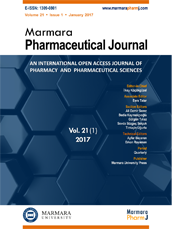Editor-in-Chief
Hatice Kübra Elçioğlu
Vice Editors
Levent Kabasakal
Esra Tatar
Online ISSN
2630-6344
Publisher
Marmara University
Frequency
Bimonthly (Six issues / year)
Abbreviation
J.Res.Pharm.
Former Name
Marmara Pharmaceutical Journal
Marmara Pharmaceutical Journal
2017 , Vol 21 , Issue 1
The Use and Selection of Design of Experiments (DoE) in the Development of Drug Product Formulation
1Mustafa Nevzat İlaç Sanayi İlaç Üretim Tesisi, Yenibosna Bahçelievler / İstanbul2Kemerburgaz Üniversitesi, Eczacılık Fakültesi, Farmasötik Teknoloji Anabilim Dalı, İstanbul
3İstanbul Üniversitesi, Eczacılık Fakültesi, Farmasötik Teknoloji Anabilim Dalı, İstanbul In recent years, despite of the increasing use of design of experiments (DoE) in the development of drug product formulation, it has still not been sufficient. It has been known that using DoE is very useful particularly formulation of solid and semi-solid dosage forms including many components and many process parameters with unknown effect on outputs. Proper use and selection of the DoE is also important at least as using DoE in the development of drug product formulation instead of the old approaches such as trial and error. Non-correctly selected type of DoE or inappropriately applied experiments and measurements results not only wasted resources and time, but also often produces confusing or misleading data. In this review, summary information about DoE, selection of suitable type of DoE, reduction of the number of factors by using statistical screening and optimization of the drug formulations using response surface modeling (RSM) are intended to give, also briefly mentioned about the application of these methods in the development of pharmaceutical formulation. A lot of quality information (mathematical models) can be produced from the few trials conducted by means of selecting and implementation of the correct type of DoE. Thus, the development time and cost can be reduced significantly. Developed product may also have a robust process which is not sensitive to variations. Keywords : Design of experiments, formulation development, drug, response surface modeling, optimization

